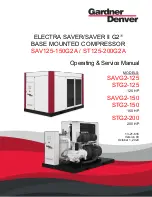
7
b. Do not place compressor under inflammable,
explosive or erosive service.
c. Do not overturn it or lift it with hooks and ropes.
DUTY CYCLE
All Makita manufactured air compressor are
recommended to be operated at no more than a 50% duty
cycle. This means an air compressor that pumps air more
than 50% of one hour is considered misuse because the
air compressor is undersized for the required air demand.
GENERAL INFORMATION
This air compressor is equipped with an Oil-Less pump
designed for durability and no maintenance.
The compressor can be used for properly rated pneumatic
nailers and staplers. An air pressure regulator is supplied
for these applications.
WARNING:
Never use compressor for applications other than to
operate a properly rated nailer and stapler. Use of the
compressor for other applications could result in property
damage and personal injury.
Separate air filter regulators combine the functions of air
regulation and/or moisture and dirt removal should be
used where applicable.
ON-RECEIPT INSPECTION
DAMAGE: Each air compressor outfit is carefully tested
and checked before shipment. With importer handling,
damage may result in transit and cause problems with
compressor operation.
Immediately upon arrival, check equipment for both
concealed and visible signs of damage to avoid expenses
being incurred to correct such problems. This should be
done regardless of any visible signs of damage to the
shipping container. If this product was shipped directly to
you, report any damages to the carrier and arrange for
inspection of goods immediately.
STORAGE
Before you store the air compressor, make sure you do
the following:
1. Review the “Maintenance” and “Operating
Procedures” sections and perform maintenance as
necessary. Be sure to drain water from air tank.
Protect the electrical cord and air hose from damage
(such as being stepped on or run over). Store the air
compressor in a clean and dry location.
DESCRIPTION OF OPERATION
DRAIN VALVE:
The drain valve is located between two sets of air tank
and is used to drain condensation with locating at a level
from the tank at the end of each use or daily.
OPERATION PANEL:
Operation Panel has power switch and mode select
switch. You can change the operation mode “CUT-IN
PRESSURE” and electrical current by mode select switch.
SWITCH:
Turn this switch to ON “|” to provide automatic power to
the pressure switch and to OFF “O” to remove power
when finished using the compressor or when compressor
will be left unattended.
This switch has a function of reset. When a thermal
protector operates, activating the function of reset, the
power is removed. Whenever the thermal protector
operates, a function of reset is activated. So even if you
turn the switch to ON “|”, compressor does not operate.
THERMAL PROTECTOR:
This compressor has a thermal protector. If the motor is
overheated by any cause, the motor is stopped by
operating a function of reset for a thermal protector.
After the motor has cooled down, the thermal protector
does not active.
PRESSURE CENSOR:
The pressure censor automatically starts the motor when
the air tank pressure drops to the factory set “cut-in”
pressure. It stops the motor when the air tank pressure
reaches the factory set “cut-out” pressure.
RELIEF VALVE:
If the pressure censor dose not shut off the air
compressor at its “cut-out” pressure setting, the relief
valve will protect against high pressure by “popping out” at
its factory set pressure which is slightly higher than the
pressure censor “cut-out” setting.
OUTLET PRESSURE GAUGE:
The outlet pressure gauge indicates the air pressure
available at the outlet side of the regulator. This pressure
is controlled by the regulator and is always less or equal
to the tank pressure. See “Operating Procedures”.
TANK PRESSURE GAUGE:
The tank pressure gauge indicates the air pressure in the
tank.
REGULATOR:
The air pressure coming from the air tank is controlled by
the regulator knob. Turn the knob clockwise to increase
pressure and counter-clockwise to decrease pressure. To
avoid minor re-adjustment after making a change in
pressure setting, always approach the desired pressure
from a lower pressure. When reducing from a higher to a
lower setting, first reduce the pressure less than the
desired pressure. Depending on the air requirements of
each particular accessory, the outlet regulated air
pressure may have to be adjusted while you are operating
the accessory.
COMPRESSED AIR OUTLET; “HP” marking
For High Pressure Pneumatic Tool Exclusive Use
Outlet Max Pressure; 2.45 MPa (24.5 bar)
COMPRESSED AIR OUTLET; “RP” marking
For Regular Pressure Pneumatic Tool Use
Outlet Max Pressure; 0.88 MPa (8.8 bar)
INSTALLATION AND BREAK-IN
PROCEDURES
LOCATION OF THE AIR COMPRESSOR
Locate the air compressor in a clean, dry and well-
ventilated area. The air filter must be kept clear of
obstructions, which could reduce air delivery of the air
compressor. The air compressor should be located at








































